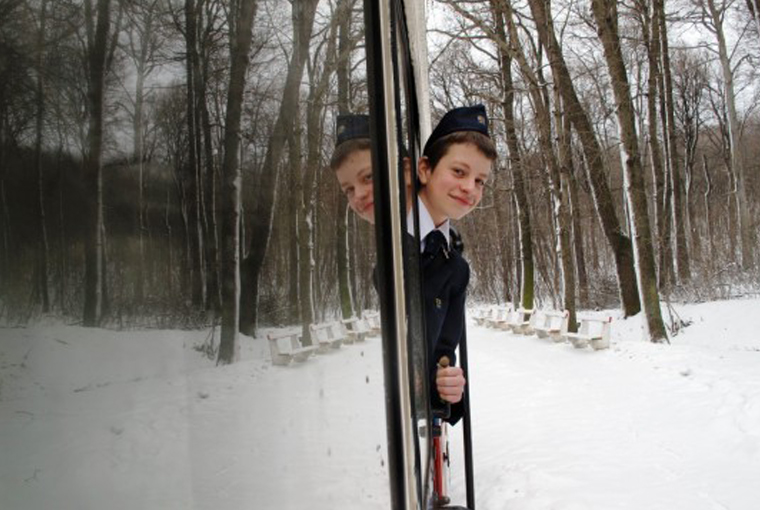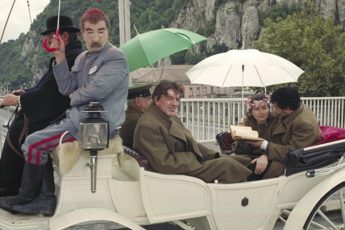Next Stop: Disillusion
Klára Trencsényi’s Train to Adulthood (Reményvasút, 2015)
Vol. 67 (September 2016) by Zoe Aiano
At first glance, it could be easy to fall into the trap of imagining Train to Adulthood to be a cutesy depiction of childhood or Communist nostalgia. The inherently endearing topic of a miniature railway once run by red-uniformed Pioneers and now in the hands of young adolescents does not obviously lend itself to a savage critique of the modern social system. Yet contrary to expectations, that’s exactly what Klára Trencsényi’s documentary does, perhaps deriving added impact from the sweetness of its central imagery.
The film makes its stance clear from the beginning, opening with a simple but powerful scene featuring Viktor, one of the young protagonists, proudly dressed in pristine train guard uniform. With a sober expression on his face, he makes the poignant, wistful statement that he wishes to be neither a child nor an adult, but would rather remain perennially in between. At this point, we see an old-fashioned locomotive enter a dark tunnel – an unequivocal visual metaphor for a daunting but unavoidable transition that launches the ensuing cinematic journey. Dissecting the title, it rapidly becomes apparent that the question of adulthood is much more significant than of the train, which essentially serves as a narrative and allegorical framework.
Indeed, there is a conspicuous but justified shortage of contextualization surrounding the railway itself. We can see from its unmistakable vintage red, white and blue aesthetic that it’s the relic of a Communist initiative. Various references indicate that it’s just outside Budapest and we see that almost all the roles are filled by children between roughly 10 and 15. Beyond that, we’re left guessing, but to focus on the train is to lose sight of the bigger picture.
Of the various earnest children seen scurrying around phoning each other up to talk in endearingly old-fashioned jargon, we follow the stories of three in particular. Viktor and Karmen, who we met in the first scene, are twins whose single mother also worked in the railway during her youth. From interviews, we come to learn of the family’s money troubles, which their mother is doing her best to hide from her children, although the prematurely serious Viktor is clearly suspicious. Gradually, as the film progresses, we see their situation worsen and reach crisis point, when the family is eventually evicted and find themselves trapped by an unforgiving welfare system that seems determined to punish rather than support. The other protagonist is Gergo, whose parents have relocated to Germany for work, and believe that he would have a better life and education there, but he himself can’t stand to leave his country or his grandma. A passionate devotee of the railway, his dream is to graduate from the children’s miniature model to the actual national network, and is reluctant to believe that even this modest aspiration seems unlikely. Thus we are left with a heart breaking picture of childhoods lost to early-onset responsibility, in the context of an extracurricular program that should be preparing the adolescents for their future lives but is in fact providing a rare and much needed respite from their burdens.
While the film’s critique of the present is self-evident, its appraisal to the past is more ambiguous. The intermittent use of archive footage (which has inevitable propagandistic tendencies given the nature of its source) adds a hint of wistful nostalgia. Although the film never makes any explicit statement favoring the “good old days”, neither is there any condemnation of the former regime, or any implication of blame for the current situation. Holders of both convictions will probably see their own opinions reflected in the film, but perhaps the train is more meaningfully understood as a metaphor for Hungary, or even Europe as a whole – forced to move forward, but with mixed sentiments about both its points of departure and arrival.
Portraying its characters with tender affection, Train to Adulthood calmly and coherently delivers a poignant message about the failure of the state to provide for its most vulnerable citizens. The quiet charm and painfully touching stoicism of the children and their families offer little consolation in the face of systematic governmental indifference, and indeed the decision to end the shoot must have ultimately been fairly arbitrary, as the stories depicted are unlikely to reach a neat conclusion in the foreseeable future. Unfortunately for us all, the example of this tiny, seemingly niche microcosm has huge relevance that extends way beyond a miniature railway, and hopefully this film will help to raise awareness and spark the debates that desperately need to take place all over Europe and beyond.




Leave a Comment